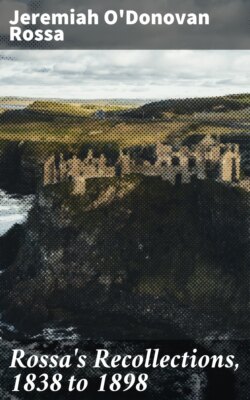Читать книгу Rossa's Recollections, 1838 to 1898 - Jeremiah O'Donovan Rossa - Страница 10
На сайте Литреса книга снята с продажи.
ОглавлениеWho ran to take me when I fell,
And would some pretty story tell,
And kiss the part to make it well.
My mother.”
“And you also left out,” said he, these two lines in the “Signs of Rain”:
Low o’er the grass the swallow wings,
The cricket, too, how sharp he sings!
“Right there, too,” said I. “But it shows that what I said was true—that I was quoting from memory, and that I was not looking into books to see whether my memory was right or wrong.”
Oh, no, Mr. Dowling, I don’t forget my mother, a tall, straight, handsome woman, when I was a child; looking stately in the long, hooded cloak she used to wear; a prematurely old, old woman when I saw her in this foreign land some years after, looking older by wearing an American bonnet instead of an Irish cloak, when I saw her Philadelphia in 1863.
I was up on the half-hatch of the door at home one day; I was looking at Lord Carbery’s hounds passing by—Geary, the huntsman, sounding the bugle; the horses prancing, carrying the “quality,” booted and spurred, and dressed in their hunting jackets of green and gold and orange. After they had passed, I came down from my perch on the half-hatch, and I heard my mother say of them to Kit. Brown:
“Ah! ’Ta oor la aguiv-se ’sa saol-seo, acht, beig aar la aguinne ’sa sao’l eile.”
Ah you have your day in this world; but we’ll have our day in the next.
This resignation to the existing condition of things in the fallen fortunes of our people was on the tongue of my mother. I don’t know that it was in her heart or in her spirit. I do not think it was. Our priests preached it. I do not think it was in their heart either. It couldn’t be; they were Irish, and belonged to the plundered race. But—but what? I don’t know: Father Jerry Molony knew as well as any priest living how his congregation came to be poor; when the Soupers would come to the parish to bribe the people into becoming Sassenachs, he’d say there were people present in the congregation whose families gave up all they had in the world rather than give up their faith. My family claimed the honor of that, and prided in it. The priest had no other consolation to give, but the consolation of religion, and, very likely, it was through religion my father and mother learned—and tried—to lighten the load of life, by telling us that the poorer you are the nearer you are to God, and that the more your sufferings are in this world the greater will be your reward in the next.
If that be gospel truth, and I hope it is, there are no people on earth nearer to heaven than the Irish people.
